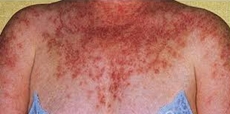Genetically engineered virus shown to “cure” patients of skin cancer
29 May 2015
A genetically engineered virus had been shown to ''cure'' patients of skin cancer, raising hopes chemotherapy would no longer be required to treat cancer one day.
 In a worldwide study led by The Institute of Cancer Research in the UK, scientists showed that the new treatment allowed some patients with melanoma to live for over three years - the benchmark many oncologists use to define a cure.
In a worldwide study led by The Institute of Cancer Research in the UK, scientists showed that the new treatment allowed some patients with melanoma to live for over three years - the benchmark many oncologists use to define a cure.
In the therapy called T-VEC, cancer cells are infected and killed while the immune system is stimulated to work against tumours.
According to Gillian Nuttall, the founder of Melanoma UK, patients showing responses beyond three years was something that up until now, could only be imagined.
Thirteen thousand cases of malignant melanoma, the fifth most-common cancer in the UK, are diagnosed each year, with 2,000 deaths each year.
Prof Paul Workman, the chief executive of The Institute of Cancer Research, London, said, ''We may normally think of viruses as the enemies of mankind, but it's their very ability to specifically infect and kill human cells that can make them such promising cancer treatments.
''In this case, we are harnessing the ability of an engineered virus to kill cancer cells and stimulate an immune response,'' The Telegraph reported.
In certain patients, the improvements were striking and although all had aggressive, inoperable malignant melanoma, those treated with the virus therapy at an earlier stage survived, on average, 20 months longer than patients given an alternative. In others patients though results were more modest, the study represented a landmark, it was the first, large, randomised trial of a so-called oncolytic virus to show success.
According to cancer scientists it would be the first of many treatments in the coming years, adding a new weapon to our arsenal of cancer treatments.
The method, called viral immunotherapy, worked by launching a "two-pronged attack" on cancer cells. Since the virus is genetically modified it cannot replicate in healthy cells. It multiplies inside the cancer cells, and bursts them from within.
Other forms of immunotherapy, the stimulation of the body's own immune system to fight cancer, using antibodies rather viruses, had been developed into successful drugs and researchers hope that T-VEC could be used in combination with these.
(Read more: World first as viral immunotherapy for skin cancer shows patient benefit in Phase III trial)



















